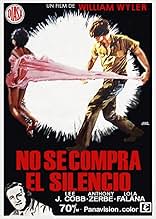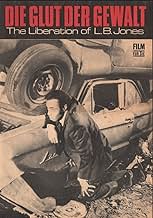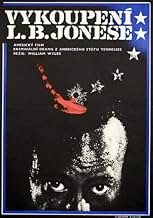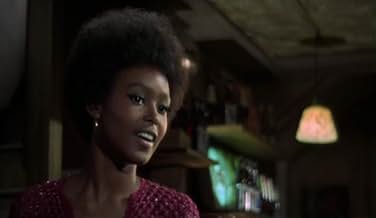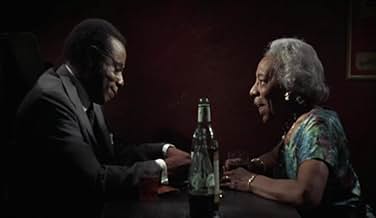ÉVALUATION IMDb
6,8/10
1,3 k
MA NOTE
Un avocat sudiste révèle la vérité sur un croque-mort assassiné.Un avocat sudiste révèle la vérité sur un croque-mort assassiné.Un avocat sudiste révèle la vérité sur un croque-mort assassiné.
- Prix
- 1 nomination au total
Joseph Attles
- Henry
- (as Joe Attles)
Avis en vedette
Obviously made in the wake of In the Heat of the Night's financial and awards success, William Wyler's final film, The Liberation of L. B. Jones, based on the novel The Liberation of Lord Byron Jones by Jesse Hill Ford (who wrote the first draft of the screenplay, later taken over by Stirling Silliphant), is another look at racist institutions in the South in the days of Jim Crow. I think, despite Norman Jewison's earlier film's successes, that Wyler left the filmmaking world on a relative high note, succeeding more fully artistically while bearing its own set of small flaws that keep it down.
The titular character, Lord Byron Jones (Roscoe Lee Browne) is the respected black undertaker in the small Tennessee town of Somerton. He is married to a young woman, Emma (Lola Falana) who has taken up an affair with one of the white police officers, Willie Joe (Anthony Zerbe), in secret enough for Willie Joe to keep the knowledge from his own wife and children (whom we never see, which I think is something of an odd choice, but I'll get to that) but not secret enough that she isn't afraid of flaunting it around the Jones house in her own room. Jones wants a divorce, and he goes to the office of Oman Hedgepath (Lee J. Cobb) to hire him in what he says will be an uncontested divorce. Only through Hedgepath's new law partner, his nephew Steve (Lee Majors), does Hedgepath decide to take the case, which quickly turns complicated when Emma decides to contest the divorce for her own reasons.
The film is an exploration of the unspoken ways that things get done in a system where the law cannot be followed in order to preserve certain customs and power centers. Willie Joe is a white man in a segregated town, and Cobb feels more for Willie Joe and the potential collapse of his life, both professional and personal, than for the cuckolded L. B. Jones of another race. So, he tells Willie Joe to convince Emma to drop the suit, implying that the only way to get out of this is to prevent the divorce from happening. Willie Joe is a not terribly bright young man who has a tendency to take advantage of his position of power to get whatever it is he wants, and he's just the kind of person who would take things too far.
My central issue with the film is Willie Joe himself. He's viciously evil in a way that leaves no room for interpretation. Part of that presentation is, I think, the complete lack of presence by his family, but it's heightened by one scene that stands out. A young black man has been taken in on a small charge, and his wife approaches him in his squad car, begging for help to get him out so he can go back to work the next day. He, along with his squad car partner, take her out into the country where Willie Joe rapes the girl. I mean, we've already seen Willie Joe slap around Emma violently when she won't do what he says, did the portrayal need to go this far? That, combined with the absence of his family makes Willie Joe really one-note in a way that smooths out any potential wrinkles. This feels like an effort on the part of Wyler and his screenwriters (the book was apparently based on some real life events in Ford's hometown, and they were not happy with him for the portrayals) probably took the character of Willie Joe in particular as an obvious signal to the audience that they were "on the right side of history" or something. It makes the drama less compelling by making the point more obvious.
Thankfully, though, the central dramatic fulcrum is not Willie Joe. It's this intricate balance between Jones himself, Hedgepath and his nephew, and a more minor character, Sonny (Yaphet Kotto). He actually begins the film by jumping off the train passing through Somerset with a pistol in a cigar box, filtering through the movie in the background and interacting with Jones in some small ways. He's a native of Somerset who fled fifteen years prior because a white cop had beaten him terribly, returned to exact vengeance. There's a mirror aspect between Sonny's decision to let his anger go because violence won't fix the problem in his soul. However, that view gets revisited when Willie Joe decides that the only way out of his problem is to take Hedgepath's suggestion to its twisted conclusion by getting what he wants no matter what.
The ending is a tragedy because it's about lost opportunities to make things better. All of the "law" that gets followed is unspoken and in direct contradiction to actual law, which is why it needs to be handled through suggestion and hushed conversations behind closed doors. Everyone knows this, most particularly Hedgepath who ends up just perpetuating the worst of the unspoken system, solving nothing but preserving a broken, unjust, and hidden system that's always in the open.
Really, the portrayal of Willie Joe is my only real issue with the film. This final film by the Golden Age of Hollywood master Wyler is just about everything I would expect from one last gasp of such a filmmaker in the changing era of the late 60s and early 70s. His precise visual style is still there, but it's muddled a bit by emerging conventions influenced by television while also falling prey to decreased budgetary wiggle room where he could only do his extended, complex takes in very enclosed environments. A more nuanced approach to the central antagonist (I wouldn't expect anything like finding out he's a great family man, but making him so thoroughly a monster without question is just too far) would have really helped take this from a solidly good film into, perhaps, something great.
Still, this is a good film for Wyler to go out on. It showed that despite the industry leaving him behind, he could have continued on in the newer system, bringing his consummate craft to newer stories with newer stars. That the film completely bombed at the box office while meeting with tepid critical notices though, was the final nail in the coffin of the man who hadn't had a real hit since Ben-Hur and was rarely a big box office crafter to begin with.
The titular character, Lord Byron Jones (Roscoe Lee Browne) is the respected black undertaker in the small Tennessee town of Somerton. He is married to a young woman, Emma (Lola Falana) who has taken up an affair with one of the white police officers, Willie Joe (Anthony Zerbe), in secret enough for Willie Joe to keep the knowledge from his own wife and children (whom we never see, which I think is something of an odd choice, but I'll get to that) but not secret enough that she isn't afraid of flaunting it around the Jones house in her own room. Jones wants a divorce, and he goes to the office of Oman Hedgepath (Lee J. Cobb) to hire him in what he says will be an uncontested divorce. Only through Hedgepath's new law partner, his nephew Steve (Lee Majors), does Hedgepath decide to take the case, which quickly turns complicated when Emma decides to contest the divorce for her own reasons.
The film is an exploration of the unspoken ways that things get done in a system where the law cannot be followed in order to preserve certain customs and power centers. Willie Joe is a white man in a segregated town, and Cobb feels more for Willie Joe and the potential collapse of his life, both professional and personal, than for the cuckolded L. B. Jones of another race. So, he tells Willie Joe to convince Emma to drop the suit, implying that the only way to get out of this is to prevent the divorce from happening. Willie Joe is a not terribly bright young man who has a tendency to take advantage of his position of power to get whatever it is he wants, and he's just the kind of person who would take things too far.
My central issue with the film is Willie Joe himself. He's viciously evil in a way that leaves no room for interpretation. Part of that presentation is, I think, the complete lack of presence by his family, but it's heightened by one scene that stands out. A young black man has been taken in on a small charge, and his wife approaches him in his squad car, begging for help to get him out so he can go back to work the next day. He, along with his squad car partner, take her out into the country where Willie Joe rapes the girl. I mean, we've already seen Willie Joe slap around Emma violently when she won't do what he says, did the portrayal need to go this far? That, combined with the absence of his family makes Willie Joe really one-note in a way that smooths out any potential wrinkles. This feels like an effort on the part of Wyler and his screenwriters (the book was apparently based on some real life events in Ford's hometown, and they were not happy with him for the portrayals) probably took the character of Willie Joe in particular as an obvious signal to the audience that they were "on the right side of history" or something. It makes the drama less compelling by making the point more obvious.
Thankfully, though, the central dramatic fulcrum is not Willie Joe. It's this intricate balance between Jones himself, Hedgepath and his nephew, and a more minor character, Sonny (Yaphet Kotto). He actually begins the film by jumping off the train passing through Somerset with a pistol in a cigar box, filtering through the movie in the background and interacting with Jones in some small ways. He's a native of Somerset who fled fifteen years prior because a white cop had beaten him terribly, returned to exact vengeance. There's a mirror aspect between Sonny's decision to let his anger go because violence won't fix the problem in his soul. However, that view gets revisited when Willie Joe decides that the only way out of his problem is to take Hedgepath's suggestion to its twisted conclusion by getting what he wants no matter what.
The ending is a tragedy because it's about lost opportunities to make things better. All of the "law" that gets followed is unspoken and in direct contradiction to actual law, which is why it needs to be handled through suggestion and hushed conversations behind closed doors. Everyone knows this, most particularly Hedgepath who ends up just perpetuating the worst of the unspoken system, solving nothing but preserving a broken, unjust, and hidden system that's always in the open.
Really, the portrayal of Willie Joe is my only real issue with the film. This final film by the Golden Age of Hollywood master Wyler is just about everything I would expect from one last gasp of such a filmmaker in the changing era of the late 60s and early 70s. His precise visual style is still there, but it's muddled a bit by emerging conventions influenced by television while also falling prey to decreased budgetary wiggle room where he could only do his extended, complex takes in very enclosed environments. A more nuanced approach to the central antagonist (I wouldn't expect anything like finding out he's a great family man, but making him so thoroughly a monster without question is just too far) would have really helped take this from a solidly good film into, perhaps, something great.
Still, this is a good film for Wyler to go out on. It showed that despite the industry leaving him behind, he could have continued on in the newer system, bringing his consummate craft to newer stories with newer stars. That the film completely bombed at the box office while meeting with tepid critical notices though, was the final nail in the coffin of the man who hadn't had a real hit since Ben-Hur and was rarely a big box office crafter to begin with.
The Liberation of L. B. Jones (1970) is currently available on Tubi. The storyline involves a black couple going through a divorce when the man discovers his wife is cheating on him with a local white police officer. When the woman hires a lawyer and threatens to fight the divorce, the police officer is informed the nature of their relationship may become public. Since white and black people sleeping together is heavily frowned upon the police officer could lose his job. He quickly goes on a rampage beating his lover and trying to hide the nature of their relationship by any means necessary. This movie is directed by William Wyler (Ben-Hur) and stars Lee J. Cobb (12 Angry Men), Lola Falana (The Klansman), Lee Majors (The Six Million Dollar Man), Roscoe Lee Browne (Logan's Run) and Yaphet Kotto (Alien). The storyline for this is very well told and portrayed. The ex-husband's patience was absolutely unbelievable, but so was his wife's ruthlesness. This movie in some ways gave me divorce PTSD. I loved the character interactions across the board and the set-up by the ruthless and dirty police officers was good, which makes the ending even more enjoyable. Overall this is a smart movie with a well told storyline I would strongly recommend seeing. I'd score this a solid 7.5/10.
Sometimes I have to scratch my head and wonder why the hell a film isn't more acclaimed and/or remembered. William Wyler's last film The Liberation of L.B. Jones (1970) is one of these. A nail biting inferno of racial hate and discomfort.
Don't read the tagline and stay away from certain posters, it might spoil it! But even though I knew part of the outcome parts of this film stopped me from breathing, and I'm still filled with this heavy indescribable feeling.
It's essentially the tale of when the people discriminated against stops being afraid. It's also an exploration of the small towns of a bygone age, and their despicable sentiments.
The Liberation of L.B. Jones would fit perfectly in the company of films in In the Heat of the Night. Perhaps it was just a tad late, or perhaps it was a bit too bleak, but this is surely a film I will remember. A wonderful way to go out for the legendary Mr. Wyler. One of the best directors who ever lived! 8.5/10
Don't read the tagline and stay away from certain posters, it might spoil it! But even though I knew part of the outcome parts of this film stopped me from breathing, and I'm still filled with this heavy indescribable feeling.
It's essentially the tale of when the people discriminated against stops being afraid. It's also an exploration of the small towns of a bygone age, and their despicable sentiments.
The Liberation of L.B. Jones would fit perfectly in the company of films in In the Heat of the Night. Perhaps it was just a tad late, or perhaps it was a bit too bleak, but this is surely a film I will remember. A wonderful way to go out for the legendary Mr. Wyler. One of the best directors who ever lived! 8.5/10
I've read the book liberties & omissions were taken, overall this movie is a true gem no sugar coating here I recommend you watch it & read the book you'll come full circle I guarantee it. I would also add a remake of this wouldn't hurt just too put more flesh on the characters & script it.
"The Liberation of L. B. Jones" is a feel-bad movie that is worth seeing...provided you aren't already seriously depressed. If you are, try watching something fun, as "The Liberation" is where fun goes to die!
The story is set in Tennessee and racism in this county is rampant. You will probably never find a movie that uses the 'n' word more...which I appreciate because it just shows how ugly racism is. The cops are evil perverters of women and justice and the place is NOT a place any black person would enjoy visiting...as they certainly would not have been welcome.
L. B. Jones happens to be the richest black man in the county and he is having problems with his wife. She's carrying on an affair with one of the cops and he's sick of it and wants a divorce. He seeks the help of a local lawyer (Lee J. Cobb) who at first refuses to take the case. But when his idealistic son-in-law shames him into taking it, he agrees...and spends much of the rest of the film perpetrating evil along with the local police department. What exactly did they do? See the film...but it certainly ain't nice!
The film came out after quite a few other race films had debuted and just before the big blacksploitation craze...so the timing was excellent. The film is brutal in the way it shows racism, as it's unflinching and will make you sick as you watch. This is a good thing...but a painful thing to see and hear. Well worth your time.
The story is set in Tennessee and racism in this county is rampant. You will probably never find a movie that uses the 'n' word more...which I appreciate because it just shows how ugly racism is. The cops are evil perverters of women and justice and the place is NOT a place any black person would enjoy visiting...as they certainly would not have been welcome.
L. B. Jones happens to be the richest black man in the county and he is having problems with his wife. She's carrying on an affair with one of the cops and he's sick of it and wants a divorce. He seeks the help of a local lawyer (Lee J. Cobb) who at first refuses to take the case. But when his idealistic son-in-law shames him into taking it, he agrees...and spends much of the rest of the film perpetrating evil along with the local police department. What exactly did they do? See the film...but it certainly ain't nice!
The film came out after quite a few other race films had debuted and just before the big blacksploitation craze...so the timing was excellent. The film is brutal in the way it shows racism, as it's unflinching and will make you sick as you watch. This is a good thing...but a painful thing to see and hear. Well worth your time.
Le saviez-vous
- AnecdotesFinal film of director William Wyler.
- Citations
Emma Jones: It going be something. I can't let nobody rob my baby and I can't let my baby enter this world without a dime!
- ConnexionsFeatured in Classified X (2007)
Meilleurs choix
Connectez-vous pour évaluer et surveiller les recommandations personnalisées
Détails
- Date de sortie
- Pays d’origine
- Langue
- Aussi connu sous le nom de
- The Liberation of Lord Byron Jones
- Lieux de tournage
- Humboldt, Tennessee, États-Unis(location shooting - used for Somerton, Tenn.)
- société de production
- Consultez plus de crédits d'entreprise sur IMDbPro
Box-office
- Budget
- 3 500 000 $ US (estimation)
Contribuer à cette page
Suggérer une modification ou ajouter du contenu manquant

Lacune principale
By what name was The Liberation of L.B. Jones (1970) officially released in India in English?
Répondre
